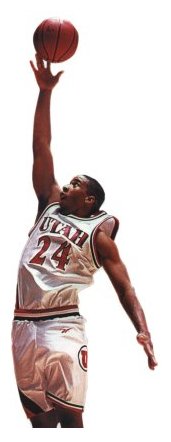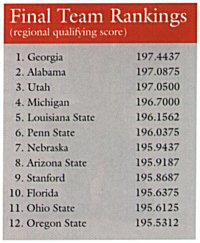
Vol. 9 No. 1 THE MAGAZINE OF THE UNIVERSITY OF UTAH Summer 1999
Continuum Home Page
- University of Utah Home Page - Alumni
Association Home Page
Questions, Comments - Table of Contents
S I D E L I N E S
Against All Odds, Miller Marked for Success
 All-American
Andre Miller did a lot that no one else could do, not the least of which
was rebounding from the stigma of Proposition 48. Miller won more games
during his career than any player in the history of the Western Athletic
Conference. During the four years that he ran the show as point guard,
the Utes posted a 110-19 record, including a 23-game winning streak that
lasted until Utah was upset by Miami of Ohio in the NCAA Tournament's
second round. This was the first time the men's basketball team was undefeated
in conference play since 1945, when Utah went 8-0 in the old Skyline Conference.
All-American
Andre Miller did a lot that no one else could do, not the least of which
was rebounding from the stigma of Proposition 48. Miller won more games
during his career than any player in the history of the Western Athletic
Conference. During the four years that he ran the show as point guard,
the Utes posted a 110-19 record, including a 23-game winning streak that
lasted until Utah was upset by Miami of Ohio in the NCAA Tournament's
second round. This was the first time the men's basketball team was undefeated
in conference play since 1945, when Utah went 8-0 in the old Skyline Conference.
Miller, the 6-foot-2,203-pound leader, didn't only shine as a Ute. He was one of the only, if not the only, Prop 48 player to graduate in four years and earn the right to play another season of college basketball. He lost one year's eligibility because of his high school test scores He graduated from the U a year ago with degrees in criminology and sociology. In doing so, Miller became one of the most prominent success stories since Proposition 48 was enacted 1 S years ago.
This was the first year a new rule was tested that allowed an extra year of eligibility for students who graduate in four years when their high school grades or SAT test scores initially keep them from collegiate eligibility. An NCAA spokesperson said the league didn't keep records on such matters, so she couldn't say whether any other basketball player this year had succeeded in earning a fifth season's play by graduating in four years. Miller had to pay his own tuition and sit out his first year. Michael Doleac was his roommate then, and Miller recalls that it was painful watching Doleac pack for road trips from which he was barred.
A graduate of Verbum Dei High School in Compton, California, Miller proved to be one of the best guards in the country. Coach Rick Majerus convinced Miller's mother Andrea Robinson that if he came to Utah, her son would graduate in four years. "No one else wanted a Prop 48 kid, so choosing Utah wasn't a tough choice," Miller says. Senior night was a teary event for Miller's grateful mom.
| Miller Facts: Utes' all-time leader in career steals. Named 98-00 national player of the year by Basketball Weekly. Tenth on the Ute career scoring list with 1,618 points. |
When his Utah career ended, Miller says that he was haunted more by being labeled an All-American than for being a Prop 48 qualifier. "People start to look at you and think of you differently just because you're named an All-American." After guiding the Utes through a spotless season, averaging 16 points and 6.8 rebounds per game, leading the school in career steals, and becoming Utah's No. 2 all-time assist leader (Jeff Jonas BA'77 was No. 1), his main label was future pro. Coming from Compton to Salt Lake City and going from non-qualifier to lottery pick, Miller took an uncommon pathway.
Women's New Look Yields Lucky 21
Twenty-one wins, a share of the regular season division title, and a postseason berth in the WNIT. Not bad for a team without a fourth-year player. Pretty good, in fact, for a team with five freshmen on a 12-player roster.
 The
excitement this year in women's basketball had everything to do with the
team's emergence from the shadows of Ali Bills and Julie Krommenhoek.
The pair produced the best back court in Utah history, earning piles of
personal awards and records, as well as providing Utah with four years
of superb basketball. When they left the University at the end of the
1997-98 school year, they took with them the sense of security Utah fans
had developed over four years.
The
excitement this year in women's basketball had everything to do with the
team's emergence from the shadows of Ali Bills and Julie Krommenhoek.
The pair produced the best back court in Utah history, earning piles of
personal awards and records, as well as providing Utah with four years
of superb basketball. When they left the University at the end of the
1997-98 school year, they took with them the sense of security Utah fans
had developed over four years.
In addition, two other starters were among the five players who left the Utah program, creating some big holes in the roster and leaving a lot of question marks: Who's going to start? Who's going to score? Does the team have any leaders? Could the team make it to the NCAA tournament again?
"We had no idea where we were at the start of this season," says coach Elaine Elliott. "We weren't really given much of a chance coming into the season with so many key players gone from last year." Utah picked up a loss in its first game. Then the Utes won three in a row. Easily. In the fifth game of the year, Utah played nationally ranked Colorado State to the final point. After six more wins, observers were starting to take Utah seriously. The Utes wound up defeating 21 opponents by an average of 11 points.
Canadian Erin Gibbons stepped into the starting lineup as a freshman and promptly became the team's leading scorer. She finished the season third in the WAC in three pointers per game. Against Fresno State, Gibbons tied Krommenhoek's record for seven three pointers in a game. Three 20-point games and 17 games in which she scored more than 10 led to the Pacific Division Freshman of the Year award for Gibbons.
After year off the court, Lori Red returned to the Utah lineup to become a cornerstone. Red averaged just under 30 minutes of floor time per game. In only her fourth game in more than a year, she scored 21 points against Kansas State. Red won first team all-WAC honors at the season's end, one of four Utes to win league awards this year.
Utah rolled off 12 straight wins in WAC play, giving all the other Pacific Division contenders at least one loss (and all except BYU and New Mexico, two). Leadership came from Red and junior point guard Tiana Fuertes, whom teammates called the squad's emotional leader.
The entire squad produced points. Nine Utah players led the Utes in scoring during the season. Sophomore Lindsay Sodja, who had been quiet most of the season, scored more than 20 in two postseason games. "We had some great individual games," says Elliott, "and we've had a great blend of young kids stepping up and performing well."
Twenty-one wins this year locked up an eleventh 20-win season for Elliott, making her by far the most winning women's basketball coach in Utah history, and in the WAC.
However, talent and history could only do so much for a young Utah team, and inexperience reared its head as the season came to a close. For the second year, Utah made an early exit from the WAC tournament in Las Vegas. And the Utes lasted just one round in the WNIT. But Utah has a team that will be largely unchanged for the next two years.
The season was all about questions, which for the most part were answered. Next year will be about potential, and whether the Utes can live up to theirs.
--Sterling Clifford is a sportswriter for the Daily Utah Chronicle.
Rule Change Maddens Marsden
After extending its home victory streak to 151 with a 12-1 season, the No. 3 University of Utah gymnastics team found itself unexpectedly heading for Corvallis, Oregon, for the first round of NCAA regional competition. Utah's lone loss of the year was to Oregon State University in Corvallis.
 Under
the "official" regional qualification guidelines set by the NCAA Gymnastics
Committee the preceding month, Utah could not have been assigned to the
West Region, which is unanimously considered the toughest region in the
nation. According to the guidelines, the Utes should have been paired
with No. 10 Florida and gone to either Utah State or West Virginia for
regional competition. When the NCAA committee changed the qualification
procedure, sending Utah to Oregon State, Coach Greg Marsden and the Utah
Athletics staff was infuriated. The NCAA Gymnastics Committee revised
its written guidelines the morning it was to announce the region fields.
The region hosted by Oregon State drew three of the nation's top five
scoring teams, including UCLA (197.775), Utah (197.625), and Oregon State
(197.400).
Under
the "official" regional qualification guidelines set by the NCAA Gymnastics
Committee the preceding month, Utah could not have been assigned to the
West Region, which is unanimously considered the toughest region in the
nation. According to the guidelines, the Utes should have been paired
with No. 10 Florida and gone to either Utah State or West Virginia for
regional competition. When the NCAA committee changed the qualification
procedure, sending Utah to Oregon State, Coach Greg Marsden and the Utah
Athletics staff was infuriated. The NCAA Gymnastics Committee revised
its written guidelines the morning it was to announce the region fields.
The region hosted by Oregon State drew three of the nation's top five
scoring teams, including UCLA (197.775), Utah (197.625), and Oregon State
(197.400).
The Utes have not lost a regular season home meet for 20 years. Utah finished the regular season ranked No.1 in the nation on the uneven bars. The Utes finished third on beam, fourth on floor, and seventh on vault. Individually, freshman Theresa Kulikowski was ranked No. 2 in the all-around, and third in the nation on both bars and beam. She ranked fourth on floor, and went into postseason competition with a shot at the school single-season win record. Kulikowski, who won 33 all-around or individual event titles in 1998-99, trails only former Utah great Missy Marlowe BA'94, who won 36 titles in 1991. Sophomore Shannon Bowles was second on beam, and senior Angie Leonard was seventh on bars.
For more Ute sports news, check out the Athletics home page at www.utahutes.com
Continuum Home Page - University of Utah Home Page - Alumni Association Home Page
Questions, Comments - Table of Contents
Copyright 1999 by The University of Utah Alumni Association